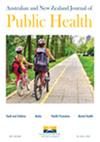Co-design of school-based strategies and supports for Aboriginal and Torres Strait Islander youth living with type 2 diabetes: A qualitative study
IF 2.4
3区 医学
Q2 PUBLIC, ENVIRONMENTAL & OCCUPATIONAL HEALTH
Australian and New Zealand Journal of Public Health
Pub Date : 2025-08-01
DOI:10.1016/j.anzjph.2025.100265
引用次数: 0
Abstract
Objective
Youth-onset type 2 diabetes is an emerging condition impacting Indigenous populations worldwide. Schools have an important role in supporting students to manage their health.
Methods
We undertook a qualitative study to (i) explore the lived experience of type 2 diabetes, diabetes management and support in school environments and (ii) co-design recommendations for age-appropriate, culturally safe school-based strategies and supports. Interviews and focus groups were undertaken with Aboriginal and Torres Strait Islander youth, caregivers, health professionals and school-based staff. Aboriginal and Torres Strait Islander youth were involved in determining the research topic.
Results
We found a need for school-based measures to address diabetes stigma, medication management, privacy and confidentiality, healthy eating and social and emotional wellbeing and identified further needs for staff training.
Conclusions
In many cases, schools are providing extensive support to students, but without adequate resources, supportive systems and policies or staff training, current approaches are insufficient.
Implications for public health
Recommendations include whole-of-school responses to address diabetes stigma and to generate sensitive approaches to nutrition, school-based management plans for students with T2D and adoption of Aboriginal and Torres Strait Islander-driven approaches.
原住民与托雷斯海峡岛民青少年2型糖尿病的校本策略与支持:一项质性研究
目的:青年发病的2型糖尿病是一种影响全球土著人口的新兴疾病。学校在支持学生管理自己的健康方面发挥着重要作用。方法:我们进行了一项定性研究,以(i)探索2型糖尿病的生活经历、学校环境中的糖尿病管理和支持;(ii)共同设计适合年龄、文化安全的学校策略和支持建议。对土著和托雷斯海峡岛民青年、照料者、保健专业人员和校本工作人员进行了访谈和焦点小组讨论。原住民和托雷斯海峡岛民青年参与了研究课题的确定。结果:我们发现需要以学校为基础的措施来解决糖尿病耻辱感、药物管理、隐私和保密、健康饮食以及社会和情感健康问题,并确定了对员工培训的进一步需求。结论在许多情况下,学校正在为学生提供广泛的支持,但由于缺乏足够的资源、支持系统和政策或人员培训,目前的方法是不够的。对公共卫生的影响。建议包括全校采取行动解决糖尿病污名问题,制定敏感的营养方法,为患有糖尿病的学生制定校本管理计划,以及采用土著居民和托雷斯海峡岛民主导的方法。
本文章由计算机程序翻译,如有差异,请以英文原文为准。
求助全文
约1分钟内获得全文
求助全文
来源期刊

Australian and New Zealand Journal of Public Health
医学-公共卫生、环境卫生与职业卫生
CiteScore
4.20
自引率
5.70%
发文量
121
审稿时长
6-12 weeks
期刊介绍:
The Australian and New Zealand Journal of Public Health (ANZJPH) is concerned with public health issues. The research reported includes formal epidemiological inquiries into the correlates and causes of diseases and health-related behaviour, analyses of public policy affecting health and disease, and detailed studies of the cultures and social structures within which health and illness exist. The Journal is multidisciplinary and aims to publish methodologically sound research from any of the academic disciplines that constitute public health.
 求助内容:
求助内容: 应助结果提醒方式:
应助结果提醒方式:


